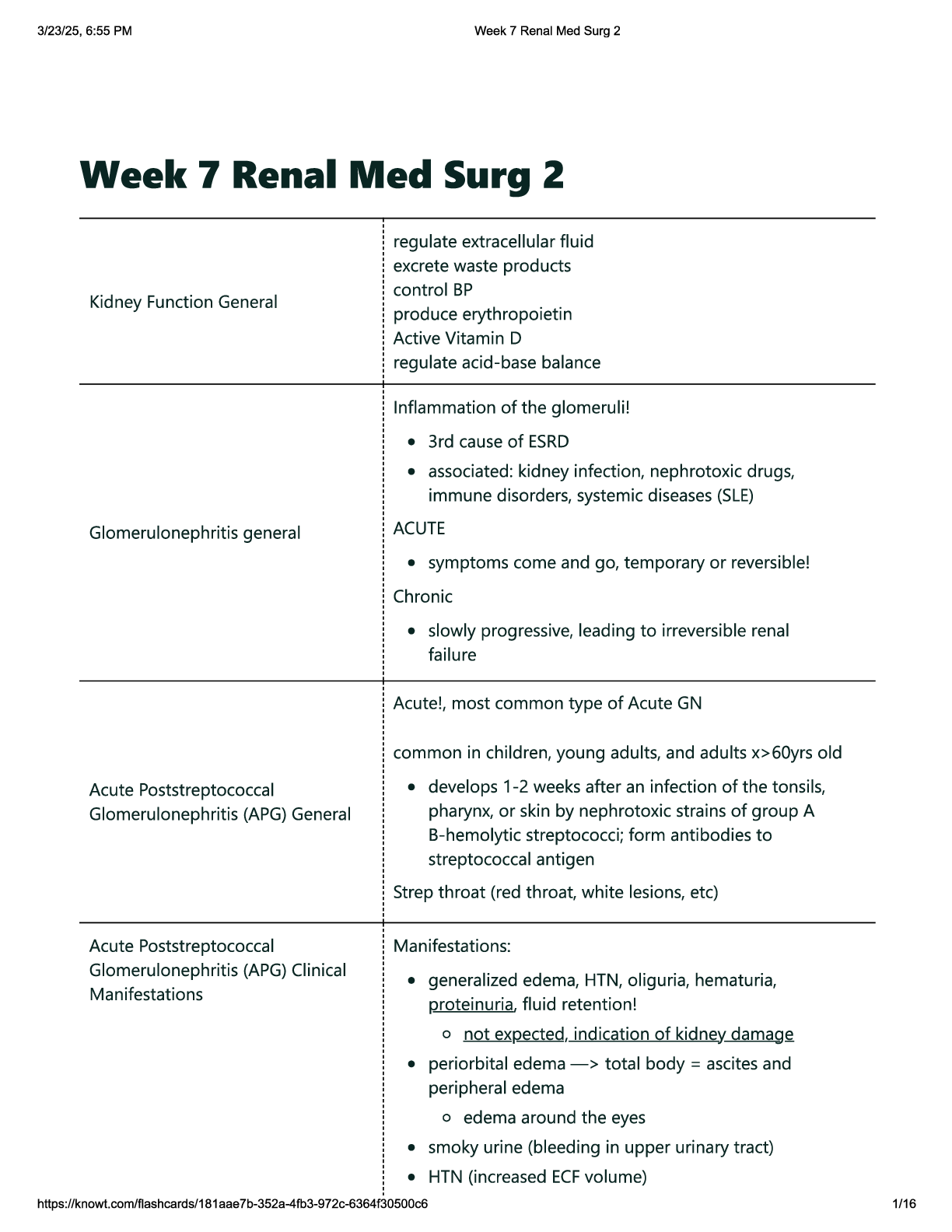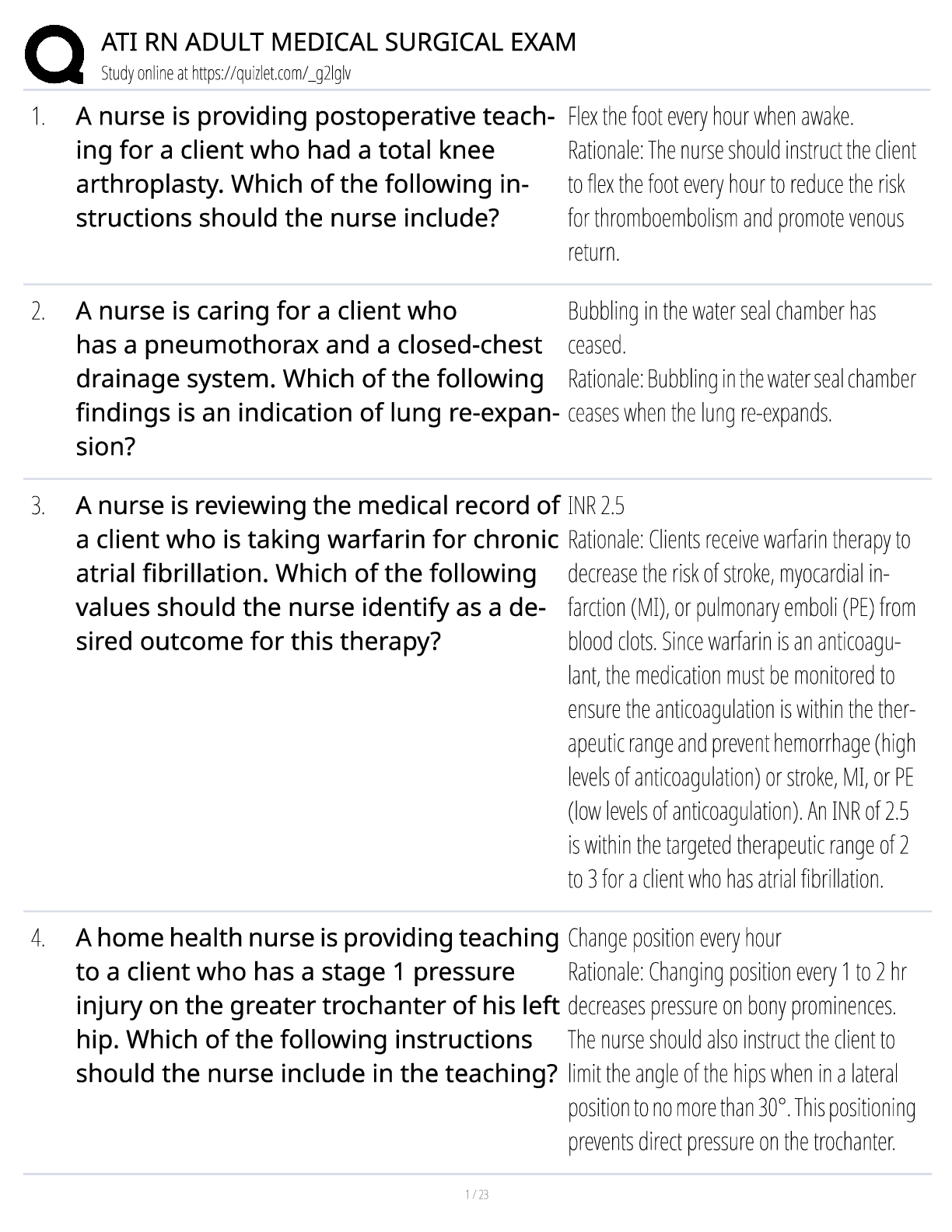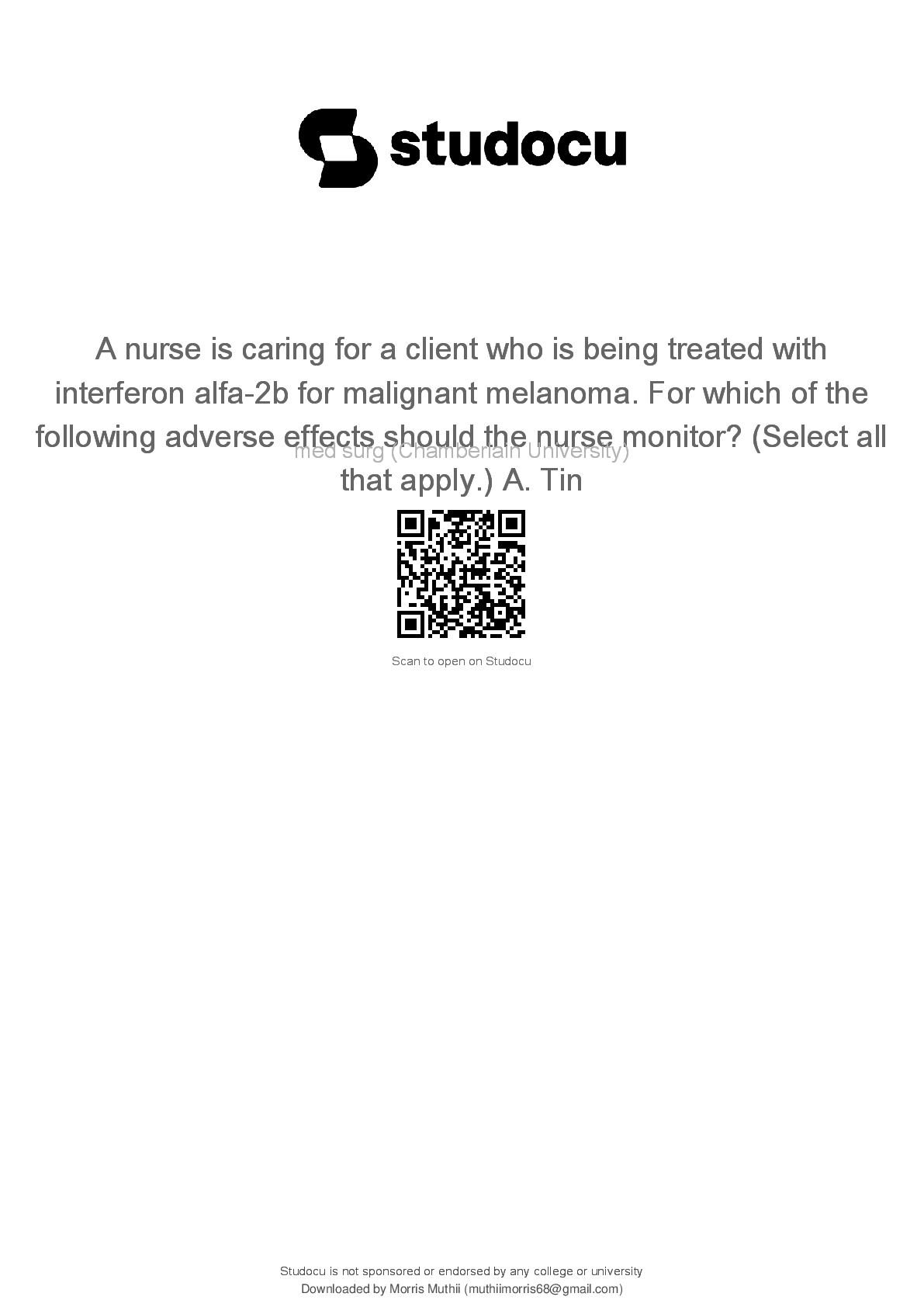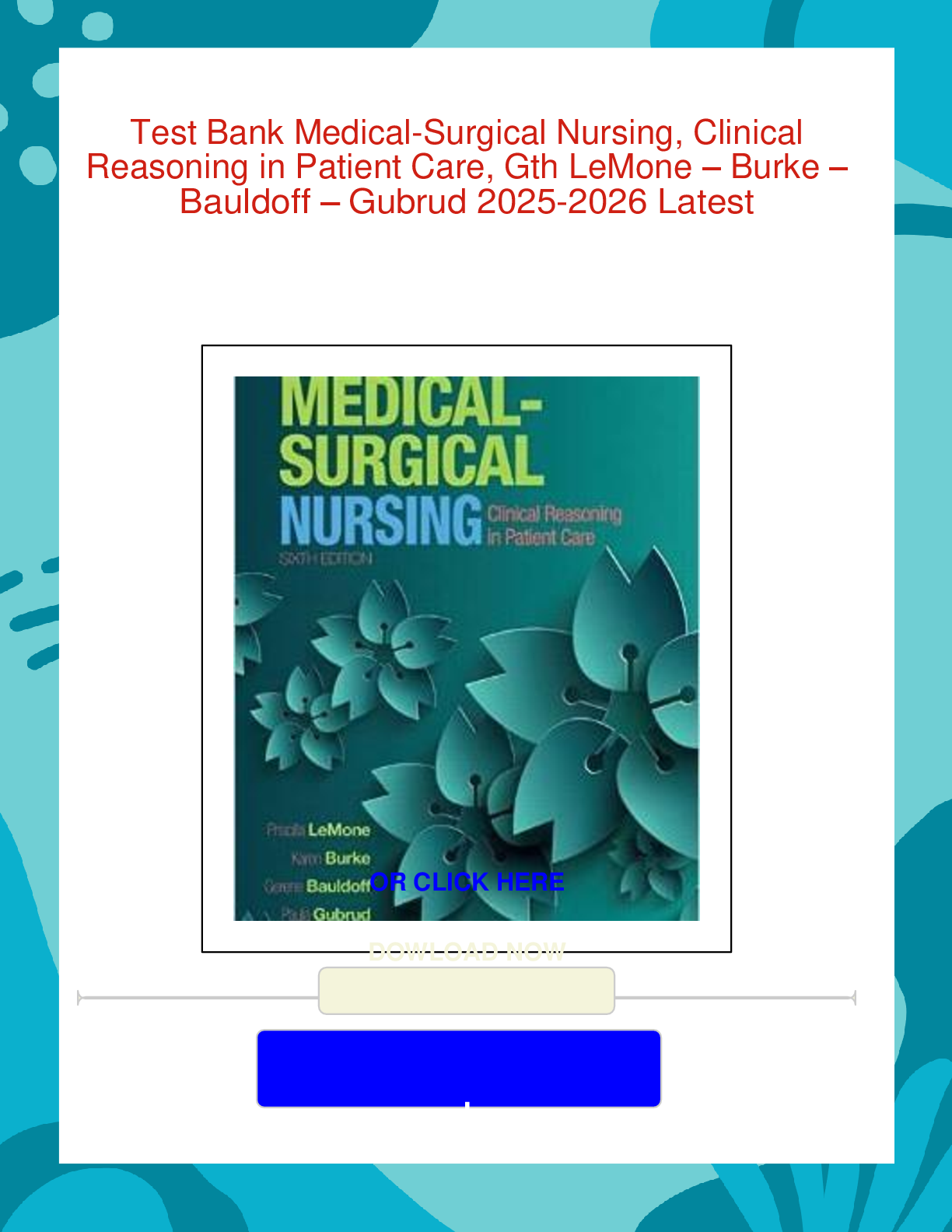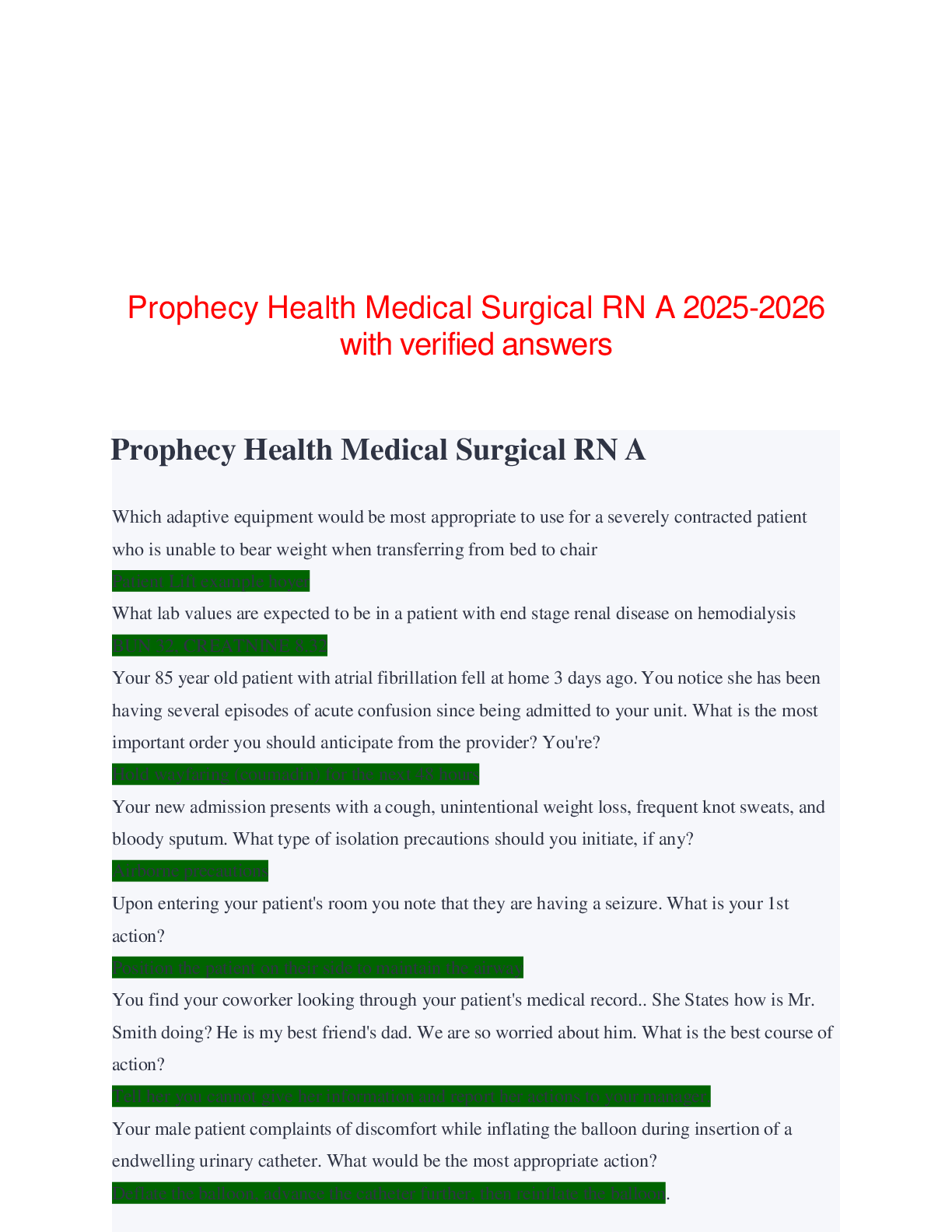*NURSING > MED-SURG EXAM > Week 7 Renal Med Surg 2 2025/2026 Latest,VERIFIED with well DETAILED Answers (All)
Week 7 Renal Med Surg 2 2025/2026 Latest,VERIFIED with well DETAILED Answers
Document Content and Description Below
Kidney Function General regulate extracellular fluid excrete waste products control BP produce erythropoietin Active Vitamin D regulate acid-base balance Glomerulonephritis general Inflammatio... n of the glomeruli! 3rd cause of ESRD associated: kidney infection, nephrotoxic drugs, immune disorders, systemic diseases (SLE) ACUTE symptoms come and go, temporary or reversible! Chronic slowly progressive, leading to irreversible renal failure Acute Poststreptococcal Glomerulonephritis (APG) General Acute!, most common type of Acute GN common in children, young adults, and adults x>60yrs old develops 1-2 weeks after an infection of the tonsils, pharynx, or skin by nephrotoxic strains of group A B-hemolytic streptococci; form antibodies to streptococcal antigen Strep throat (red throat, white lesions, etc) Acute Poststreptococcal Glomerulonephritis (APG) Clinical Manifestations Manifestations: generalized edema, HTN, oliguria, hematuria, proteinuria, fluid retention! not expected, indication of kidney damage periorbital edema —> total body = ascites and peripheral edema edema around the eyes smoky urine (bleeding in upper urinary tract) HTN (increased ECF volume) 3/23/25, 7:35 PM Week 7 Renal Med Surg 2 https://knowt.com/flashcards/181aae7b-352a-4fb3-972c-6364f30500c6 1/16 abdominal or flank pain can be asymptomatic; found on routine urinalysis Acute Poststreptococcal Glomerulonephritis (APG) Diagnosis Diagnosis: H&P Renal biopsy = confirmation! Dipstick urinalysis and urine sediment microscopy erythrocytes/casts protein BUN and serum creatinine renal impairments HIGHER these labs = worse the kidneys If GFR is lower = worse the kidneys BUN normal range 10-20 Creatine Normal Range 0.6 - 1.2 GFR normal range x > 90 Acute Poststreptococcal Glomerulonephritis (APG) Treatment treatment dependent on cause! diet restriction restrict diuretics! kidneys are not working so diuretics won’t work Rest! Cause streptococcal —> give antibiotics! APG Diet Restrictions Diet limit protein and meat foods limit fluids and sodium Nephrolithiasis: Risk Factors Kidney Stones Risk factors Metabolic abnormalities —> increased pH, calcium, oxalate, uric acid decreased citrate Climate 3/23/25, 7:35 PM Week 7 Renal Med Surg 2 https://knowt.com/flashcards/181aae7b-352a-4fb3-972c-6364f30500c6 2/16 warm —> fluid loss —> more concentrated urine Diet! increase tea&fruit juice oxalate excessive protein increase uric acid low fluid intake = urine more concentrated Genetic family hx Lifestyle immobile, obesity, sedentary concentration of supersaturated crystals precipitate and form stones reduce risk by keeping urine dilute and free flowing! high in oxalate nuts, leafy greens Nephrolithiasis: Types 5 categories: calcium oxalate calcium phosphate cystine struvite (UTI) Uric Acid Calcium most common Treatment based on what type of stones! adjust diet or give antibiotics 3/23/25, 7:35 PM Week 7 Renal Med Surg 2 https://knowt.com/flashcards/181aae7b-352a-4fb3-972c-6364f30500c6 3/16 Nephrolithiasis: Clinical Manifestations First Symptom Sudden, severe pain! renal colic flank area, back, lower abdomen ureter stretches, dilates, and spasms can also see nausea and vomiting, dysuria, fever, chills, moist, cool skin Common Sites of Obstruction Ureteropelvic Junction (UPJ) dull costovertebral flank pain or renal colic Ureterovesical junction (UVJ) lower abdominal pain; testicular or labial pain Nephrolithiasis: Diagnostic Studies Diagnostic Studies noncontract helical (spiral) CT scan Ultrasound Urinalysis 24 hour urine 24 hour urine For recurrent stones to measure calcium, phosphorus, magnesium, sodium oxalate, citrate, cysteine, sulfate, potassium, uric acid, and total urine volume for nephrolithiasis retrieval and analysis of stones Nephrolithiasis: Interprofessional Care 2 Interprofessional Care Pain Management acute attack opioids, NSAIDs, alpha adrenergic blockers Antibiotics if indicated Evaluate cause and prevent further development! get H&P, attack the cause Nephrolithiasis: Treatment and Patient Teaching Treatment & Patient Teaching Adequate hydration NA restriction Diet Changes 3/23/25, 7:35 PM Week 7 Renal Med Surg 2 https://knowt.com/flashcards/181aae7b-352a-4fb3-972c-6364f30500c6 4/16 Drugs can change the pH of urine, prevent excess urinary secretion of a substance or correct primary disease Struvite stones: antibiotics Nephrolithiasis: Treatment for Stones Stone 4mm and less —> pass naturally @ HOME can take weeks stone has passed = decrease in pain, and urine must be strained to confirm it has passed Surgery if stones are too large causes injury or infection Symptoms extracorporeal shock-wave lithotripsy (ESWL) [Show More]
Last updated: 4 months ago
Preview 5 out of 69 pages

Loading document previews ...
Buy this document to get the full access instantly
Instant Download Access after purchase
Buy NowInstant download
We Accept:

Reviews( 0 )
$26.50
Can't find what you want? Try our AI powered Search
Document information
Connected school, study & course
About the document
Uploaded On
Mar 23, 2025
Number of pages
69
Written in
Additional information
This document has been written for:
Uploaded
Mar 23, 2025
Downloads
0
Views
22

